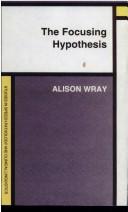| Listing 1 - 10 of 35 | << page >> |
Sort by
|
Book
ISBN: 1421423340 9781421423340 9781421423333 1421423332 Year: 2017 Publisher: Baltimore, Maryland : Baltimore, Md. : Johns Hopkins University Press, Project MUSE,
Abstract | Keywords | Export | Availability | Bookmark
 Loading...
Loading...Choose an application
- Reference Manager
- EndNote
- RefWorks (Direct export to RefWorks)
Written in a lively style that mixes personal biography with scholarly research, On the Other Hand tells a comprehensive story about the science, traditions, and prejudices surrounding left-handedness.
Attitude --- Mental Disorders --- Functional Laterality --- etiology
Periodical
Abstract | Keywords | Export | Availability | Bookmark
 Loading...
Loading...Choose an application
- Reference Manager
- EndNote
- RefWorks (Direct export to RefWorks)
Functional Laterality --- Laterality --- Cerebral dominance --- Latéralité --- Dominance cérébrale --- Periodicals. --- Periodicals --- Périodiques --- Cerebral dominance. --- Laterality. --- Health Sciences --- General and Others --- Neurology --- Psychiatry & Psychology --- Physiology --- Health Sciences. --- Psychiatry & Psychology. --- Functional Laterality. --- Psychology. --- Dominance, Cerebral --- Functional asymmetry (Brain) --- Hemispheric dominance (Brain) --- Lateralization (Brain) --- Left and right brain --- Right and left brain --- Ambidexterity --- Behavioral Laterality --- Handedness --- Laterality of Motor Control --- Mirror Writing --- Laterality, Behavioral --- Laterality, Functional --- Mirror Writings --- Motor Control Laterality --- Writing, Mirror --- Writings, Mirror --- Cerebral hemispheres --- Dual-brain psychology --- Whole brain learning --- Split-Brain Procedure --- Psychophysiology
Book
Year: 2016 Publisher: Frontiers Media SA
Abstract | Keywords | Export | Availability | Bookmark
 Loading...
Loading...Choose an application
- Reference Manager
- EndNote
- RefWorks (Direct export to RefWorks)
The performance of most tasks with one hand, typically the right, is a uniquely human characteristic. Not only do people prefer to use one hand rather than the other, but also they usually perform tasks faster and more accurately with this hand. The study of manual asymmetries and what such performance differences between the two hands reveal about brain organization and motor function has been a topic of considerable research over the last several decades. The aim of this Research Topic is to review and further explore the origins of manual asymmetries and their relationship to handedness, unimanual and bimanual motor performance, and brain function. The articles included here involve original research conducted in humans or non-human models species, as well as theoretical perspectives, review articles, and meta-analyses.
Cerebral dominance. --- Motor ability. --- Laterality. --- grasping --- footedness --- hand performance --- Practice --- manual asymmetries --- hand preference --- Lifespan --- laterality --- sex differences
Book
ISBN: 9781622571086 1622571088 9781622570409 1622570405 Year: 2012 Publisher: New York
Abstract | Keywords | Export | Availability | Bookmark
 Loading...
Loading...Choose an application
- Reference Manager
- EndNote
- RefWorks (Direct export to RefWorks)
Laterality. --- Left and right (Psychology) --- Prejudices. --- Bias (Psychology) --- Prejudgments --- Prejudice --- Prejudices and antipathies --- Attitude (Psychology) --- Emotions --- Laterality --- Psychology --- Psychophysiology --- Cerebral dominance --- Dual-brain psychology

ISBN: 9027243336 1556193890 9786613424419 9027277206 128342441X 9789027277206 9781556193897 9789027243331 Year: 1992 Volume: 3 Publisher: Amsterdam ; Philadelphia : J. Benjamins Pub. Co.,
Abstract | Keywords | Export | Availability | Bookmark
 Loading...
Loading...Choose an application
- Reference Manager
- EndNote
- RefWorks (Direct export to RefWorks)
This book explores the nature of the control of language processing by the hemispheres of the neocortex. The author expounds a novel hypothesis, "The Focusing Hypothesis", which holds that language processing in the brain is achieved through analytic and holistic systems, the former through left and the latter through right hemisphere processing. This hypothesis differs from current thinking in so far as it proposes that the involvement of the two systems (and two hemispheres) depends on the strategy selected by the speaker and that the engagement by one hemisphere over another will depend upo
Cerebral dominance --- Neurolinguistics --- Neuro-linguistics --- Biolinguistics --- Higher nervous activity --- Neuropsychology --- Dominance, Cerebral --- Functional asymmetry (Brain) --- Hemispheric dominance (Brain) --- Lateralization (Brain) --- Left and right brain --- Right and left brain --- Cerebral hemispheres --- Dual-brain psychology --- Laterality --- Whole brain learning --- Cerebral dominance. --- Neurolinguistics. --- Brain--Laterality --- Cerebral laterality --- Cerebrale dominantie --- Complementary specialization (Brain) --- Dominance [Cerebral ] --- Dominance cerebrale --- Laterality [Cerebral ] --- Neurolinguistique --- Neurolinguïstiek
Book

ISBN: 8024623064 9788024623061 9788024622859 Year: 2014 Publisher: Prague, [Czech Republic] : Karolinum Press,
Abstract | Keywords | Export | Availability | Bookmark
 Loading...
Loading...Choose an application
- Reference Manager
- EndNote
- RefWorks (Direct export to RefWorks)
Laterality --- Neuropsychiatry --- Behavioral neurology --- Biological psychiatry --- Neurology --- Psychophysiology --- Cerebral dominance --- Dual-brain psychology --- Physiological aspects.
Book
ISBN: 9781614705185 1614705186 9781614705024 161470502X Year: 2012 Publisher: Hauppauge, N.Y. : Nova Science Publishers,
Abstract | Keywords | Export | Availability | Bookmark
 Loading...
Loading...Choose an application
- Reference Manager
- EndNote
- RefWorks (Direct export to RefWorks)
Left- and right-handedness. --- Handedness --- Right- and left-handedness --- Laterality --- Left and right (Psychology) --- Hand
Book
Year: 2015 Publisher: Frontiers Media SA
Abstract | Keywords | Export | Availability | Bookmark
 Loading...
Loading...Choose an application
- Reference Manager
- EndNote
- RefWorks (Direct export to RefWorks)
Left-right asymmetries of structure and function are a common organization principle in the brains of humans and non-human vertebrates alike. While there are inherently asymmetric systems such as the human language system or the song system of songbirds, the impact of structural or functional asymmetries on perception, cognition and behavior is not necessarily limited to these systems. For example, performance in experimental paradigms that assess executive functions such as inhibition, planning or action monitoring is influenced by information processing in the bottom-up channel. Depending on the type of stimuli used, one hemisphere can be more efficient in processing than the other and these functional cerebral asymmetries have been shown to modulate the efficacy of executive functions via the bottom-up channel. We only begin to understand the complex neuronal mechanisms underlying this interaction between hemispheric asymmetries and cognitive systems. Therefore, it is the aim of this Research Topics to further elucidate how structural or functional hemispheric asymmetries modulate perception, cognition and behavior in the broadest sense.
lateralization --- Brain --- Language --- handedness --- hemispheric asymmetry --- Executive Function --- brain structure --- laterality
Book
Year: 2015 Publisher: Frontiers Media SA
Abstract | Keywords | Export | Availability | Bookmark
 Loading...
Loading...Choose an application
- Reference Manager
- EndNote
- RefWorks (Direct export to RefWorks)
Reading is an integral part of life in today's information-driven societies. Since the pioneering work of Dejerine on "word blindness" in brain-lesioned patients, the literature has increased exponentially, from neuropsychological case reports to mechanistic accounts of word processing at the behavioural, neurofunctional and computational levels, tapping into diverse aspects of visual word processing. These studies have revealed some exciting findings about visual word processing, including how the brain learns to read, how changes in literacy impact upon word processing strategies, and whether word processing mechanisms vary across different alphabetic, logographic or artificial writing systems. Other studies have attempted to characterise typical and atypical word processes in special populations in order to explain why dyslexic brains struggle with words, how multilingualism changes the way our brains see words, and what the exact developmental signatures are that would shape the acquisition of reading skills. Exciting new insights have also emerged from recent studies that have investigated word stimuli at the system/network level, by looking for instance, at how the reading system interacts with other cognitive systems in a context-dependent fashion, how visual language stimuli are integrated into the speech processing streams, how both left and right hemispheres cooperate and interact during word processing, and what the exact contributions of subcortical and cerebellar regions to reading are. The contributions to this Research Topic highlight the latest findings regarding the different issues mentioned above, particularly how these findings can explain or model the different processes, mechanisms, pathways or cognitive strategies by which the human brain sees words. The introductory editorial, summarising the contributions included here, highlights how varieties of behavioural tests and neuroimaging techniques can be used to investigate word processing mechanisms across different alphabetic and logographic writing systems.
Word processing. --- Learning --- fMRI --- Word Processing --- Multilingualism --- ERP --- reading --- Dyslexia --- laterality

ISBN: 1280539992 9786610539994 0198024525 1429407921 9781429407922 0195066758 9780195066753 0195083520 9780195083521 9781280539992 6610539995 9780198024521 Year: 1991 Publisher: New York ; Oxford : Oxford University Press,
Abstract | Keywords | Export | Availability | Bookmark
 Loading...
Loading...Choose an application
- Reference Manager
- EndNote
- RefWorks (Direct export to RefWorks)
Apes cannot talk; nor are they left or right handed. In this engaging account of language, evolution, and the brain, Michael Corballis shows why these two facts are intimately connected. Humans alone can learn and manipulate language because of a biological device in the left hemisphere of the brain (a specialization that causes handedness). In fascinating detail, he describes how this device emerged through the evolutionary pressures faced by our ancestors. He then shows how it works in a deft account of symbols, grammar, and vocabulary. Ranging across anthropology, biology, and linguistics, this book offers an engrossing look at what makes humans so unique.
Laterality. --- Brain --- Human evolution. --- Evolution (Biology) --- Physical anthropology --- Evolutionary psychology --- Human beings --- Psychophysiology --- Cerebral dominance --- Dual-brain psychology --- Evolution. --- Origin
| Listing 1 - 10 of 35 | << page >> |
Sort by
|

 Search
Search Feedback
Feedback About
About Help
Help News
News